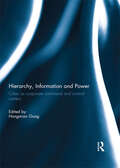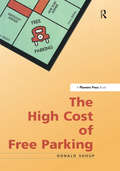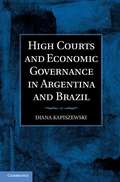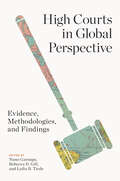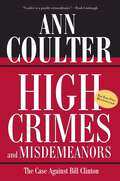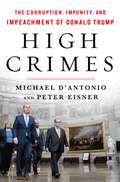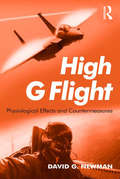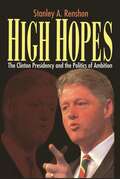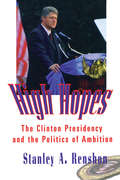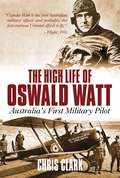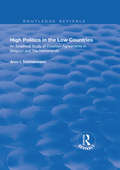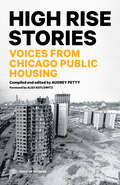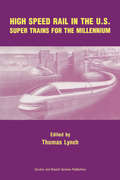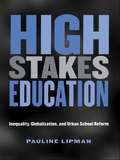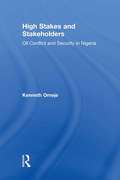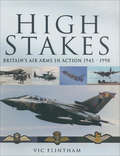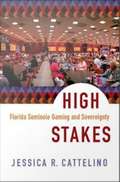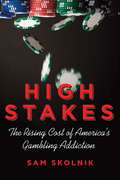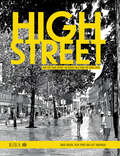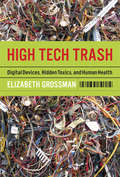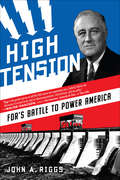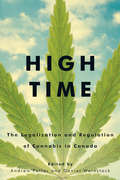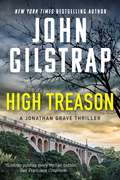- Table View
- List View
Hierarchy, Information and Power: Cities as Corporate Command and Control Centers
by Hongmian GongThis book is a collection of selected papers presented in the 2012 annual meeting of the Association of American Geographers in New York honoring James O. Wheeler (1938-2010). The eight papers are informed and inspired by James O. Wheeler's many contributions to urban geography, particularly in the areas of urban hierarchy, information flows, cities in the telecommunications age, and cities as corporate command and control centers. They adopt and extend Jim Wheeler’s corporate and/or hierarchical approaches to discuss institutional investment in the U.S., corporate interlocking directorates and fast-growing firms in Canada, corporate intangible assets in South Korea, urban development in Beijing and Macau, and social and cultural diversity of global cities such as New York. Although these two approaches are not the fanciest ones in today's urban geography, they are essential to the understanding of how urban areas are connected and what drives this interconnectedness in this age of globalization. This book was previously published as a special issue of Urban Geography.
High Cost of Free Parking
by Donald ShoupOff-street parking requirements are devastating American cities. So says the author in this no-holds-barred treatise on the way parking should be. Free parking, the author argues, has contributed to auto dependence, rapid urban sprawl, extravagant energy use, and a host of other problems. Planners mandate free parking to alleviate congestion, but end up distorting transportation choices, debasing urban design, damaging the economy, and degrading the environment. Ubiquitous free parking helps explain why our cities sprawl on a scale fit more for cars than for people, and why American motor vehicles now consume one-eighth of the world's total oil production. But it doesn't have to be this way. The author proposes new ways for cities to regulate parking, namely, charge fair market prices for curb parking, use the resulting revenue to pay for services in the neighborhoods that generate it, and remove zoning requirements for off-street parking.
High Courts and Economic Governance in Argentina and Brazil
by Diana KapiszewskiHigh Courts and Economic Governance in Argentina and Brazil analyzes how high courts and elected leaders in Latin America interacted over neoliberal restructuring, one of the most significant socioeconomic transformations in recent decades. Courts face a critical choice when deciding cases concerning national economic policy, weighing rule of law concerns against economic imperatives. Elected leaders confront equally difficult dilemmas when courts issue decisions challenging their actions. Based on extensive fieldwork in Argentina and Brazil, this study identifies striking variation in inter-branch interactions between the two countries. In Argentina, while high courts often defer to politicians in the economic realm, inter-branch relations are punctuated by tense bouts of conflict. Brazilian courts and elected officials, by contrast, routinely accommodate one another in their decisions about economic policy. Diana Kapiszewski argues that the two high courts' contrasting characters - political in Argentina and statesman-like in Brazil - shaped their decisions on controversial cases and conditioned how elected leaders responded to their rulings, channeling inter-branch interactions into persistent patterns.
High Courts in Global Perspective: Evidence, Methodologies, and Findings (Constitutionalism and Democracy)
by Tom Ginsburg Sunita Parikh Diana Kapiszewski Melinda Gann Hall Amanda Driscoll Chris Hanretty Russell Smyth Aylin Aydin-Cakir Tanya Bagashka Clifford Carrubba Joshua Fischman Joshua Fjelstul Lori Hausegger Lewis A. Kornhauser Dominique H. Lewis Chien-Chih Lin Christopher ZornHigh courts around the world hold a revered place in the legal hierarchy. These courts are the presumed impartial final arbiters as individuals, institutions, and nations resolve their legal differences. But they also buttress and mitigate the influence of other political actors, protect minority rights, and set directions for policy. The comparative empirical analysis offered in this volume highlights important differences between constitutional courts but also clarifies the unity of procedure, process, and practice in the world’s highest judicial institutions.High Courts in Global Perspective pulls back the curtain on the interlocutors of court systems internationally. This book creates a framework for a comparative analysis that weaves together a collective narrative on high court behavior and the scholarship needed for a deeper understanding of cross-national contexts. From the U.S. federal courts to the constitutional courts of Africa, from the high courts in Latin America to the Court of Justice of the European Union, high courts perform different functions in different societies, and the contributors take us through particularities of regulation and legislative review as well as considering the legitimacy of the court to serve as an honest broker in times of political transition. Unique in its focus and groundbreaking in its access, this comparative study will help scholars better understand the roles that constitutional courts and judges play in deciding some of the most divisive issues facing societies across the globe. From Africa to Europe to Australia and continents and nations in between, we get an insider’s look into the construction and workings of the world’s courts while also receiving an object lesson on best practices in comparative quantitative scholarship today.Contributors:Aylin Aydin-Cakir, Yeditepe University, Turkey * Tanya Bagashka, University of Houston * Clifford Carrubba, Emory University * Amanda Driscoll, Florida State University * Joshua Fischman, University of Virginia * Joshua Fjelstul, Washington University in St. Louis * Tom Ginsburg, University of Chicago * Melinda Gann Hall, Michigan State University * Chris Hanretty, University of London * Lori Hausegger, Boise State University * Diana Kapiszewski, Georgetown University * Lewis A. Kornhauser, New York University * Dominique H. Lewis, Texas A&M University * Chien-Chih Lin, Academia Sinica, Taiwan * Sunita Parikh, Washington University in St. Louis * Russell Smyth, Monash University, Australia * Christopher Zorn, Pennsylvania State UniversityConstitutionalism and Democracy
High Crimes and Misdemeanors: The Case Against Bill Clinton (Americana Ser.)
by Ann CoulterIn this New York Times bestseller, Coulter mercilessly pillories Clinton and examines the abuses and excesses of Bill Clinton point by point. She also shreds every conceivable defense of the Clintons to bits as she probes the major Clinton scandals, including Monica, Filegate, the China connection, the travel office snafu, and the fundraising fiascos. In the last chapter, Coulter reviews the history of the impeachment process and makes an emotional case for Clinton's impeachment.
High Crimes: The Corruption, Impunity, and Impeachment of Donald Trump
by Michael D'Antonio Peter EisnerTwo award-winning journalists offer the most comprehensive inside story behind our most significant modern political drama: the House impeachment of Donald Trump. Having spent a year essentially embedded inside several House committees, Michael D'Antonio and Peter Eisner draw on many sources, including key House leaders, to expose the politicking, playcalling, and strategies debated backstage and to explain the Democrats' successes and apparent public failures during the show itself.High Crimes opens with Nancy Pelosi deciding the House should take up impeachment, then, in part one, leaps back to explain what Ukraine was really all about: not just Joe Biden and election interference, but a money grab and oil. In the second part, the authors recount key meetings throughout the run up to the impeachment hearings, including many of the heated confrontations between the Trump administration and House Democrats. And the third part takes readers behind the scenes of those hearings, showing why certain things happened the way they did for reasons that never came up in public.In the end, having illuminated every step of impeachment, from the schemes that led Giuliani to the Ukraine in 2016 to Fiona Hill's rebuking the Republicans' conspiracy theories, High Crimes promises to be Trump's Final Days.
High G Flight: Physiological Effects and Countermeasures
by David NewmanThis book provides a unique, authoritative and detailed examination of the physiological and clinical consequences of human exposure to high G forces. Pilots of military fast jets, civilian aerobatic pilots and astronauts during the launch and re-entry phases of spaceflight are frequently and repetitively exposed to high G forces, for which the human body is not fundamentally designed. The book examines not only the nature of the high G environment, but the physiological effects of exposure to high G on the various systems of the human body. In particular, the susceptibility of the human cardiovascular system to high G is considered in detail, since G-Induced Loss of Consciousness (G-LOC) is a serious hazard for high G pilots. Additionally, the factors that influence tolerance to G and the emerging scientific evidence of physiological adaptation to high G are examined, as are the various countermeasures and techniques that have been developed over the years to protect pilots from the potentially adverse consequences of high G flight, such as the G-suit and positive pressure breathing. The accumulated knowledge of human exposure to high G is drawn together within High G Flight, resulting in a definitive volume on the physiological effects of high G and their countermeasures.
High Hopes
by Stanley A RenshonThe Clinton presidency is pivotal, occurring at a particularly sensitive time in American and world history. The Cold War has ended; yet Americans face daunting social and economic problems and are increasingly divided about how to address them. In this perceptive psychological portrait of Clinton and his presidency, expert Stanley Renshon investigates whether Clinton has demonstrated the requisite qualities of judgment, vision, character, and skill to meet the challenges he faces, domestically and internationally, and whether he merits another term. Renshon incisively analyzes Clinton's sweeping ambitions, his enormous confidence in himself and his goals, and his success in convincing people that he genuinely cares about them. He reveals a Bill Clinton whose capacity for political success is often undermined by the very traits for which many praise him. His unusually high self-confidence, for instance, leads him to believe that he can accomplish what others have not, that he can, for instance, reconcile polar opposites such as liberal Democrats and conservative Republicans. Remarkably persistent throughout Clinton's career are certain character traits which have defined him to the public--his tendency to make promises he can't keep, his ability to win people over in person, his sudden blind rages. Renshon traces the development of Clinton's character from his early family experiences to his highly successful adolescence and long political career. He illustrates how each step along the way--Clinton's inconsistent experiences as an adored but disregarded child, his attempt to avoid the draft and the consequences of doing so, his marriage to Hillary Rodham whose own psychology has both helped and hurt him, and his tenure as governor during which his character first became a political issue--is crucial to understanding his erratic and controversial presidency. Renshon explores the nature of the Clinton marriage as a political partnership and looks at Hillary Clinton as an associate president. High Hopes gives us a new understanding of why a man with so many talents has become a president whose performance has not measured up to his promise.
High Hopes: Bill Clinton and the Politics of Ambition
by Stanley A RenshonThe Clinton presidency is pivotal, occurring at a particularly sensitive time in American and world history. The Cold War has ended; yet Americans face daunting social and economic problems and are increasingly divided about how to address them. In this perceptive psychological portrait of Clinton and his presidency, expert Stanley Renshon investigates whether Clinton has demonstrated the requisite qualities of judgment, vision, character, and skill to meet the challenges he faces, domestically and internationally, and whether he merits another term. Renshon incisively analyzes Clinton's sweeping ambitions, his enormous confidence in himself and his goals, and his success in convincing people that he genuinely cares about them. He reveals a Bill Clinton whose capacity for political success is often undermined by the very traits for which many praise him. His unusually high self-confidence, for instance, leads him to believe that he can accomplish what others have not, that he can, for instance, reconcile polar opposites such as liberal Democrats and conservative Republicans. Remarkably persistent throughout Clinton's career are certain character traits which have defined him to the public--his tendency to make promises he can't keep, his ability to win people over in person, his sudden blind rages. Renshon traces the development of Clinton's character from his early family experiences to his highly successful adolescence and long political career. He illustrates how each step along the way--Clinton's inconsistent experiences as an adored but disregarded child, his attempt to avoid the draft and the consequences of doing so, his marriage to Hillary Rodham whose own psychology has both helped and hurt him, and his tenure as governor during which his character first became a political issue--is crucial to understanding his erratic and controversial presidency. Renshon explores the nature of the Clinton marriage as a political partnership and looks at Hillary Clinton as an associate president. High Hopes gives us a new understanding of why a man with so many talents has become a president whose performance has not measured up to his promise.
High Hopes: The Clinton Presidency and the Politics of Ambition
by Stanley A. RenshonNow in paperback, this perceptive psychological portrait of Clinton and his presidency investigates whether Clinton has demonstrated the necessary qualities of judgment, vision, character and skill, as well as his ambition and extreme self-confidence. Renshon traces the development of Clinton's character from his early family experiences to his adolescence and long political career, including the controversy surrounding Clinton's draft-dodging and marriage.
High Ideals and Noble Intentions
by Peter R. ElsonThe relationships between governments and the voluntary sector in Canada are long-standing and complex. Beginning with an historical overview of developments in voluntary sector-government relations from 1600 to 1930, High Ideals and Noble Intentions goes on to explore more recent events and to bring present day policy and practice into focus.Peter R. Elson examines critical historical events in the relationship between the federal government and the voluntary sector which continue to exert their influence. He demonstrates through in-depth case studies that these events are critical to understanding contemporary voluntary sector-government relations. Elson explores the impact of the regulation of charities based on amendments to the 1930 Income War Tax Act; the shift from citizen-based program funding to service-based contract funding in the mid-1990s; and advocacy regulation changes in the 1980s. Elson's case is strengthened by an important and timely comparison between voluntary sector and central government relations in Canada and England. This historically informed comparative analysis provides the basis for practical recommendations meant to improve the future of voluntary sector-government relations across Canada.
High Life of Oswald Watt: Australia's First Military Pilot
by Chris Clark‘Father of the Flying Corps’ and ‘Father of Australian Aviation’ were two of the unofficial titles conferred on Oswald (“Toby”) Watt when he died in tragic circumstances shortly after the end of the First World War. He had become the Australian Army’s first qualified pilot in 1911, but spent the first 18 months of the war with the French Air Service, the Aéronautique Militaire , before arranging a rare transfer to the Australian Imperial Force. Already an experienced combat pilot, he rose quickly through the ranks of the Australian Flying Corps, becoming a squadron leader and leading his unit at the battle of Cambrai, then commander of No 1 Training Wing with the senior AFC rank of lieutenant colonel. These were elements in a colourful and at times romantic career long exciting interest and attention—not just during Wat’s lifetime but in the interval since his death nearly a century ago. His name had been rarely out of Australian newspapers for more than a decade before the war, reflecting his wealthy lifestyle and extensive and influential social and political connections. But this focus has enveloped Watt’s story with an array of false and misleading elements verging on mythology. For the first time, this book attempts to establish the true story of Watt’s life and achievements, and provide a proper basis for evaluating his place in Australian history.
High Politics in the Low Countries: An Empirical Study of Coalition Agreements in Belgium and The Netherlands (Routledge Revivals)
by Arco I. TimmermansThis title was first published in 2003.This informative text deals with the emergence of coalition agreements, their contents, the problem of enforcement and with the question of whether or not the functions are performed in practice. It explores the idea that policy bargaining in government formation is not just an isolated process, but that it is a real chance for parties to deal with substantive and controversial issues at an early stage. The coalition agreements in which these issues are incorporated have become important in most multiparty systems, but they have received little attention in political science research. This book argues that more systematic attention for these institutional variables is highly useful in coalition research because it helps to explain processes and outcome in coalition politics.
High Rise Stories
by Audrey PettyIn the gripping first-person accounts of High Rise Stories, former residents of Chicago's iconic public housing projects describe life in the now-demolished high-rises. These stories of community, displacement, and poverty in the wake of gentrification give voice to those who have long been ignored, but whose hopes and struggles exist firmly at the heart of our national identity.
High Speed Rail in the US: Super Trains for the Millennium
by Thomas LynchAn original approach for dealing with High Speed Rail (HSR) transportation development in the United States, this book serves as a blueprint for such development by providing an in-depth evaluation of the different systems and their inherent linkage to other transportation modes, their potential costs, financing options, system benefits, the curren
High Stakes Education: Inequality, Globalization, and Urban School Reform (Critical Social Thought)
by Pauline LipmanNoted scholar Pauline Lipman explores the implications of education accountability reforms, particularly in urban schools, in the current political, economic, and cultural context of intensifying globalization and increasing social inequality and marginalization along lines of race and class.
High Stakes and Stakeholders: Oil Conflict and Security in Nigeria
by Kenneth OmejeNigeria is Africa's largest oil producing country. Oil generates enormous wealth but also extensive and devastating conflict in the country. High Stakes and Stakeholders critically explores the oil conflict in Nigeria, its evolution, dynamics and most significantly, the interplay and consequences of high stake politics for the reproduction and persistence of the conflict. It presents a conceptual anatomy of state-oil industry-society relations and demonstrates how the embedded material interests and accumulation patterns of different stakeholders underlie, shape and complicate both the oil conflict and security. In addition, the book provides key insights into comparable conflicts elsewhere in the global south, developing a logical framework for resolving the oil conflict in Nigeria and for reforming the security sector. This book is valuable reading material for courses in international political economy, social ecology, development studies, African politics, conflict and security studies, and environmental law and management. It will also be of interest to policy practitioners, civil societies and the oil industry.
High Stakes: Britain's Air Arms in Action, 1945–1990
by Vic FlinthamAfter the dust of World War II had settled, the military position of the UK was far from straightforward. It was of course allied to the USA and part of NATO, but it was at odds with the former in maintaining an Empire and the two nations also had competing oil interests in the Middle East. The UK's engagement in war after 1945 was thus a strange mixture ranging from homeland security through insular actions within the colonies or protectorates to preserve empire - to playing a major role in confronting the USSR. The types of active involvement of the RAF, Fleet Air Arm and Army Air Corps between 1945 and 1995 include the following, with examples.Maintaining Local Stability - Greece, Netherlands East Indies. Maintaining Empire - Malaya, Kenya. Defending Empire - Borneo. Defending Interests - Suez, Kuwait. Homeland Security - Northern Ireland, air defence. Confrontation - Berlin Airlift, Korea. Covert Action - Albania, strategic reconnaissance. Humanitarian and Peacekeeping- Jordan, Cyprus. Development of Deterrent - Bombs, bombers and missiles.
High Stakes: Florida Seminole Gaming and Sovereignty
by Jessica R. CattelinoIn 1979, Florida Seminoles opened the first tribally operated high-stakes bingo hall in North America. At the time, their annual budget stood at less than $2 million. By 2006, net income from gaming had surpassed $600 million. This dramatic shift from poverty to relative economic security has created tangible benefits for tribal citizens, including employment, universal health insurance, and social services. Renewed political self-governance and economic strength have reversed decades of U. S. settler-state control. At the same time, gaming has brought new dilemmas to reservation communities and triggered outside accusations that Seminoles are sacrificing their culture by embracing capitalism. In High Stakes, Jessica R. Cattelino tells the story of Seminoles' complex efforts to maintain politically and culturally distinct values in a time of new prosperity. Cattelino presents a vivid ethnographic account of the history and consequences of Seminole gaming. Drawing on research conducted with tribal permission, she describes casino operations, chronicles the everyday life and history of the Seminole Tribe, and shares the insights of individual Seminoles. At the same time, she unravels the complex connections among cultural difference, economic power, and political rights. Through analyses of Seminole housing, museum and language programs, legal disputes, and everyday activities, she shows how Seminoles use gaming revenue to enact their sovereignty. They do so in part, she argues, through relations of interdependency with others. High Stakes compels rethinking of the conditions of indigeneity, the power of money, and the meaning of sovereignty.
High Stakes: The Rising Cost of America's Gambling Addiction
by Sam SkolnikAmerica is becoming hooked on gambling. From the millions of dens and dorm rooms lit by online poker games to the neighborhoods transformed by new casinos and slot machine parlors, legalized gambling has become an integral part of our lives. With a singular blend of investigative journalism and poignant narratives of gambling addiction, award-winning journalist Sam Skolnik provides an in-depth exploration of the consequences of this national phenomenon. The result is High Stakes, an unflinching look at the explosive growth of legalized gambling in our country, the concurrent rise of addicted gamblers, and what it all means. Thirty-five years ago, casinos were legal in just one state, Nevada. Today, legalized gambling has morphed into a $92 billion industry established in all but two states. As elected officials are urging voters to expand gambling's reach, the industry's supporters and their equally impassioned detractors are squaring off in prolonged state-by-state battles. Millions of Americans are being asked to decide: Are the benefits worth the costs? Industry officials and their political allies assert that gambling is an effective way to raise revenue and create jobs. But these rewards come at a steep price. Fast-rising numbers of addicted gamblers are causing higher indebtedness and bankruptcy rates, as well as increased divorces, suicides, and gambling-related crime. Skolnik shows how the gambling industry is targeting Asian Americans--and why this population, more than any other ethnic group, is likely to develop gambling problems. He also illustrates how gambling has helped turn Las Vegas into America's most dysfunctional community, and how the upsurge of poker and Internet gambling has created a new generation of gambling junkies. In High Stakes, we meet politicians eager to promote legalized gambling as an economic cure-all, scientists wrestling with the meaning of gambling addiction, and ensnared players so caught up in the chase that they've lost their livelihoods and their minds. Throughout it all, Skolnik--an avid poker player--never loses sight of the human side of these struggles.From the Hardcover edition.
High Street: How our town centres can bounce back from the retail crisis
by David Rudlin Vicky Payne Lucy MontagueThe high street is in crisis. How did we get here and what happens next? The global pandemic has made the crisis immeasurably worse but it wasn’t the cause. The crisis was already raging in 2019 with thousands of store closures. Large retailers became complacent and failed to respond to changing consumer behaviour. Town centres are the victims of these changes rather than the cause of them. To understand the current crisis and how it might be addressed, this book takes a long view of retailing based on a hundred case studies. It looks at the way town centres responded to previous crises and explores current trends affecting town centres and how places are responding. The message is optimistic: adaptable town centres can once more become the diverse, characterful, independent places that existed before they were homogenised by big retail. Explore the past – understand the present – find a better future.
High Tech Trash: Digital Devices, Hidden Toxics, and Human Health
by Elizabeth GrossmanThe Digital Age was expected to usher in an era of clean production, an alternative to smokestack industries and their pollutants. But as environmental journalist Elizabeth Grossman reveals in this penetrating analysis of high tech manufacture and disposal, digital may be sleek, but it's anything but clean. Deep within every electronic device lie toxic materials that make up the bits and bytes, a complex thicket of lead, mercury, cadmium, plastics, and a host of other often harmful ingredients.High Tech Trash is a wake-up call to the importance of the e-waste issue and the health hazards involved. Americans alone own more than two billion pieces of high tech electronics and discard five to seven million tons each year. As a result, electronic waste already makes up more than two-thirds of the heavy metals and 40 percent of the lead found in our landfills. But the problem goes far beyond American shores, most tragically to the cities in China and India where shiploads of discarded electronics arrive daily. There, they are "recycled"-picked apart by hand, exposing thousands of workers and community residents to toxics.As Grossman notes, "This is a story in which we all play a part, whether we know it or not. If you sit at a desk in an office, talk to friends on your cell phone, watch television, listen to music on headphones, are a child in Guangdong, or a native of the Arctic, you are part of this story."The answers lie in changing how we design, manufacture, and dispose of high tech electronics. Europe has led the way in regulating materials used in electronic devices and in e-waste recycling. But in the United States many have yet to recognize the persistent human health and environmental effects of the toxics in high tech devices. If Silent Spring brought national attention to the dangers of DDT and other pesticides, High Tech Trash could do the same for a new generation of technology's products.
High Tension: FDR's Battle to Power America
by John A. RiggsAn account of Franklin Roosevelt&’s battle against the power industry to bring electricity to rural communities in the United States. When Franklin Delano Roosevelt took office in the depths of the Depression, high tension―or high voltage―power lines had been marching across the country for decades, delivering urban Americans a parade of life-transforming inventions from electric lights and radios to refrigerators and washing machines. But most rural Americans still lived in the punishing pre-electric era, unconnected to the grid, their lives consumed and bodies broken by backbreaking chores.High Tension is the story of FDR&’s battle against the &“Power Trust,&” an elaborate Wall Street-controlled web of holding companies, to electrify all of America―even when the corrupt captains of the industry and their cronies (led by a formidable and honest champion, Wendell Willkie, whose role in the battle propelled him to a presidential bid to unseat Roosevelt in 1940) cried that running lines to rural areas would not be profitable and that in a free market there would simply have to be a divide between the electricity haves and have-nots. Roosevelt knew better. And in this story of shrewd political maneuvering, controversial legislation, New Deal government organizations like the Tennessee Valley Authority, the packing of Federal courts, towering business figures, greedy villains, and the crying needs of farmers and other rural citizens desperate for services critical to their daily lives, John A. Riggs has chronicled democracy&’s greatest balancing act of government intervention with private market forces. Here is the tale of how FDR&’s efforts brought affordable electricity to all Americans, powered the industrial might that won World War II, and established a model for public-private solutions today in areas such as transportation infrastructure, broadband, and health care.Praise for High Tension &“The little known but captivating story of electricity is at the heart of the New Deal. John A. Riggs is the perfect person to tell the tale.&” ―Walter Isaacson, author of The Innovators, Leonardo da Vinci, and Steve Jobs &“[A] lucid and compelling tale. This is a fresh angle of vision on one of the most important and under-appreciated stories of the first half of the 20th century.&” ―Jonathan Alter, author of The Defining Moment: FDR&’s Hundred Days and the Triumph of Hope &“An innovative history of the chaos and conniving that created America&’s transformative electricity system. . . . A compelling read. Thoroughly researched and gracefully written. . . . A must for historians, it is also a gripping read for all.&” ―Martin J. Sherwin, Pulitzer Prize-winning co-author of American Prometheus: The Triumph and Tragedy of J. Robert Oppenheimer &“[A]n exhaustive look at President Franklin Roosevelt&’s multipronged war against the private utility sector. . . . Riggs dives deep into the legislative, judicial, and public opinion battles over Roosevelt&’s energy initiatives, including the Tennessee Valley Authority, and argues that the hybrid public-private system that emerged in America was critical to the nation&’s &“economic global supremacy&” during and after WWII. . . . [T]his authoritative account is a valuable resource for students of America&’s energy policy.&” ―Publishers Weekly
High Time: The Legalization and Regulation of Cannabis in Canada
by Andrew Potter Daniel WeinstockCanada has become the first G7 country to legalize cannabis, and the world is watching. The primary concern facing the Liberal government as it seeks to fulfill its 2015 campaign promise to “legalize, regulate, and restrict access to marijuana” is whether it can be done without making the situation worse. As the Liberal platform pointed out, the current regime lets illegal cannabis fall into the hands of minors, pours large profits into organized crime, and traps many people in the criminal justice system for what is arguably a victimless crime. <P><P> While the legalization of marijuana in Canada begins with a straightforward change of the criminal code, its ramifications go far beyond this. Legalization will have a serious impact on the country's international treaty commitments, interprovincial relations, taxation and regulatory regimes, and social and health policies. The essays in this book address these outcomes from three main perspectives: the decades-long political path to legalization; the assumptions that underwrite the new policy, in particular the desire to stamp out the black market; and how legalization in Canada looks in an international context. <P><P> Bringing together analysis by policy makers and scholars, including the architect of marijuana legislation in Portugal – a trailblazing jurisdiction – High Time provides an urgent and necessary overview of Canada's Cannabis Act.
High Treason (A Jonathan Grave Thriller #5)
by John GilstrapWhen the First Lady is kidnapped, a rescue specialist discovers her secrets—and a deadly conspiracy—in a thriller by the New York Times bestselling author. First Lady Anna Darmond&’s penchant for late night parties in South East D.C. is a harmless open secret—until she&’s kidnapped out from under the noses of her Secret Service agents in a bloody gunfight. It's an unthinkable crime that, if revealed, could cause public panic. That&’s why hostage rescue specialist Jonathan Grave and his team must operate in absolute secrecy. But Grave soon realizes that, extraordinary as it is, the mission is not all it seems. There are shadows in Mrs. Darmond's past, cracks in the presidential marriage—and leaks in the country's critical shields of security. As Grave tracks the missing First Lady through a labyrinth of lies and murder, he confronts a traitor at the highest level of Washington power—and a devastating scheme to bring a nation to its knees.
